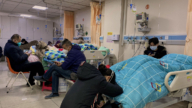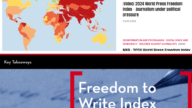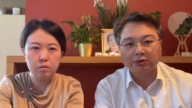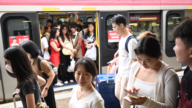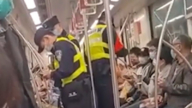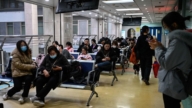【新唐人2011年6月17日讯】这个月10号发生的广州增城新塘大规模冲突事件,引发海内外舆论的强烈关注。15号,广州市公安局发布消息声称,已经抓捕了事件中传播“孕妇丈夫被打死”的散布者。与此同时,中共党报《人民日报》也首度发文,定性增城发生的是“外来劳工与本地人冲突事件”。评论人士认为,当局在转嫁矛盾,而真正的矛盾是“农民工和政府之间的官民矛盾”。
广州增城新塘大规模冲突事件,目前事态暂时趋于和缓。尽管这起冲突事件让各界舆论热烈关注,但中共当局一直保持静音。15号,中共党报《人民日报》姗姗来迟刊登了一篇时评,标题是《流动时代唱好融合大戏》。
时评说,近来,一些地方接连发生了本地人与外来务工人员的摩擦事件。虽然冲突已经过去,但那‘外来人员殴打当地人、当地人殴打不会讲本地话的外地人’的情景,仍深深刺痛了人们。
《人民日报》这篇时评虽然没有直接点名,但外界认为,这是北京首次间接对最近在潮州和增城发生的冲突事件发表看法。
前陕西电视台编辑马晓明:“你把老百姓镇压下去了,你把游行的、抗争的老百姓镇压下去,引起事端的原因,你们找到没有?把对人民的侵害,这些事件你们查处没有?不查处,照样贪污、照样去掠夺,老百姓还要抗争的,还会起来。”
马晓明表示,当局不彻底解决问题的根源,被欺压的民众会采访更极端的方式去对抗政府。
马晓明:“现在不是说没有流血,现在不是说没有死人,(中共)打死打伤打残多少人。老百姓忍无可忍,他不可能说不反抗啊!什么叫极端的呢?就是有组织的,真正真刀真枪的进行长期的武装抗争的。我们现在都不敢排除有这样的情况啊,这还在后面呢!”
本月初发生的潮州四川民工讨薪被砍伤,从而引发了大规模抗议;而新塘发生冲突的起因是,来自四川省的孕妇王联梅在摆摊时,遭到当地治安队的殴打,招致民众的不满和抗议。
对《人民日报》把两起冲突定性为本地人与外来务工人员的摩擦事件,在美国纽约的劳工活动人士刘念春认为,要追根溯源的话,造成的原因,还是共产党建政之初就有的“城乡二元化”社会结构。
刘念春(纽约劳工活动人士):“这种社会结构实际上就是对农民的一种歧视。这次说是四川人和广东人发生冲突,实际上还是农民工去城里打工他受到的不公正待遇。所以它要维护自己的权益。这时候就变成了农民工和城市人之间的矛盾。实际上他的矛盾应该是农民工和政府矛盾。政府现在把这个矛盾转嫁了, 转嫁到城市人身上了。”
香港《苹果日报》评论员李平也认为,如果刻意渲染民工与当地居民的冲突,未免有帮当局转移视线的嫌疑。
1958年,中共当局颁布了《户口登记条例》,开始实行城乡二元管理的户籍制度,产生了现代户籍制度中的“农村户口”,也就是城乡之间不能自由迁移。而这一制度随着城乡之间交流越来越广泛,早就引起了争议与指责。
今年4月,《中国经济时报》报导了中共国务院发展研究中心课题组,对全国6232名农民工进行问卷调查。调查显示,目前农民工在城市遭遇“边缘化”,被当作廉价劳动力对待,非但没有被城市吸收,反而遭到忽视、歧视和伤害。如果处理不当,这种情况将构成一个破坏“稳定”的重大威胁。
新唐人记者李静、萧宇、采访报导。
CCP Blames Migrants For Conflicts
The large-scale riots that broke out in Guangzhou
on June 10 have drawn great media attention.
On June 15, Guangzhou police claimed
to have arrested the person spreading the news about
“a pregnant woman’s husband beaten to death.”
Also, the Chinese Communist Party (CCP)
mouthpiece People’s Daily claimed that the cause
was “conflict between migrant works and locals.”
Experts believe that the regime is trying to avoid responsibility, because the real cause was
“conflict between migrant works and local officials.”
The large-scale riots that broke out in Xintang District
of Guangzhou have temporarily ceased.
While the event drew great media attention,
the Chinese regime remains silent. On June 15,
People’s Daily published a commentary titled
“Integration Importance During Age of Migration.”
The commentary said there were a series of conflicts
between locals and migrant workers recently.
While the conflicts have passed, the memories of
“migrant workers beating locals, and locals
beating migrants” still pains people deeply.
While no names were given in the article,
many believe that the regime is referring to
on the recent riots in Chaozhou and Zengcheng.
Former Shanxi TV editor Ma Xiaoming:
“You have suppressed the people who went on riot,
but have you found the cause of the conflict?
People are suffering, have you investigated? No.
You continue to corrupt and rob.
The general public will fight again, it will stand up again.”
Ma Xiaoming said that if the regime does not solve
the root cause, the suppressed citizens will seek
even more extreme measures to fight back.
Ma Xiaoming: “They say no blood was spilled
and no one was killed, but how many did the CCP
beat to death or disability? The people cannot bear
anymore; they can’t say they won’t fight back!
What is extreme? Is it to organize and start
long periods of armed protests? We can’t even say
that this doesn’t already exist. And more will come!”
Earlier this month, a migrant worker from Sichuan
seeking his pay, was stabbed with a knife,
leading to a large scale protest; then in Xintang,
police assaulted a pregnant woman, Wang Lianmei
from Sichuan, leading to public unrests and protests.
Regarding People’s Daily’s claim that both incidents
are due to conflicts between migrant workers
and locals, New York labor activist Liu Nianchun
believes the real cause is the “urban-rural separation”
which started with the CCP.
Liu Nianchun: “This social structure discriminates
against farmers. They say conflict between Sichuan
migrants and Guangdong locals, but in reality
it’s farmers working in cities being mistreated,
so they had to protect their rights. Then it became
conflict between migrant workers and locals.
The actual conflict is between the migrant workers
and regime. CCP is trying to shift responsibility.”
Hong Kong’s Apple Daily commentator Li Ping
believes that deliberately rendering the conflict
between migrant workers and locals
helps the regime divert attention.
In 1958, the Chinese regime issued “Household
Registration Regulations” which separate the urban
and rural systems. This created “rural household”
classification, which meant people from rural areas
can not move freely to the city. As exchanges
between rural and urban areas increase,
the policy has attracted controversy and criticism.
In April, China Economic Times reported
on a state Development Research Center survey
on 6232 migrant workers. The survey shows
that migrant workers in cities are marginalized,
treated as cheap labor; they are not integrated,
but instead ignored and discriminated against.
If not handled properly, this issue will constitute
a major threat to CCP’s “stability.”
NTD reporters Li Jing and Xiao Yu


